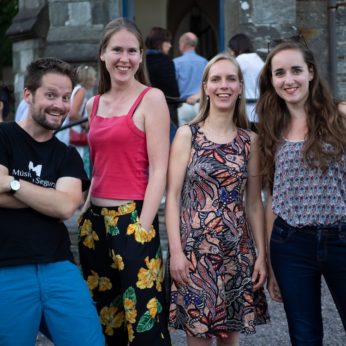Composer: Mieczyslaw Weinberg (b. 1919 - d. 1996)
Performance date: 02/07/2018
Venue: St. Brendan’s Church
Composition Year: 1944
Duration: 00:10:34
Recording Engineer: Ciaran Cullen, RTÉ
Instrumentation: 2vn, va, vc
Instrumentation Category:String Quartet
Artists:
Dudok Quartet Amsterdam Judith van Driel [violin], Marleen Wester [violin], Marie-Louise de Jong [viola], David Faber [cello]) -
[quartet]

Mieczyslaw Weinberg [1919-1996]
Quartet No.3 in D minor Op.14 [1944]
1. Presto – attacca
2. Andante sostenuto – attacca
3. Allegretto
Weinberg was born in Warsaw and his earliest musical activities were as pianist in his father’s Jewish theatre. He was playing in a fashionable café on 6 September 1939 when he heard the Nazis were at the gates of Warsaw. From that day on he seemed to bear a charmed life escaping death time and again on his flight to the Russian border. The Soviets took him in and he was able to continue his studies at the Conservatoire in Minsk. On 21 June 1941 he was awarded his Diploma at a performance of his Symphonic Poem by the Minsk Philharmonia. A few hours later the Nazis invaded the Soviet Union and Weinberg, despite having no travel authorisation, managed to find his way to Tashkent, where he met and married his first wife. By 1943 the rumours of this extraordinary Polish composer in Tashkent had reached Shostakovich, who took one look at the score of his First Symphony and arranged for Weinberg to move to Moscow. The two composers became firm friends, regularly playing four-hand piano together, while the senior composer’s advocacy undoubtedly helped Weinberg’s career.
Later in life Weinberg described his survivor’s guilt: Unfortunately there were innumerable fates similar to mine. And if I consider myself marked out by the preservation of my life, then that gives me a kind of feeling that it is impossible to repay the debt, that no 24-hours-a-day, seven-days-a-week creative hard labour would take me even an inch towards paying it off.
His powerful Third Quartet dates from 1944. German armies were still in Russia, the Siege of Leningrad was only raised in January, Weinberg still did not know what had happened to the family he left behind in Warsaw. This Quartet was never published in his lifetime and there is no record of it being performed. Like the diaries of the Leningrad survivors, it was too harsh, too realistic for a regime anxious to impose its own propaganda. It was eventually published in 2003 and it was given its belated premiere by Quatuor Danel in October 2007.
The Quartet is in three big movements played without a break. The first movement takes no prisoners with its ferocious, hard-driven opening subject based on a broad cello melody. Eventually the music calms for the gorgeous second subject, a glimpse of a better world. All these ideas are vehemently worked through in the development. The Andante follows without a break, a lament for the millions who died with music of heart-breaking beauty. Such music is hard to follow – the Finale is heralded by an extended series of pizzicato chords before its gentle, questioning theme enters and is passed around the instruments. Eventually the music just dies away.
Francis Humphrys
Copyright © 2025 West Cork Music. All rights reserved.
Designed and developed by Matrix Internet